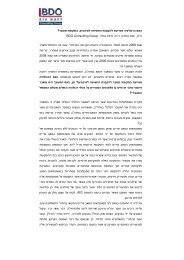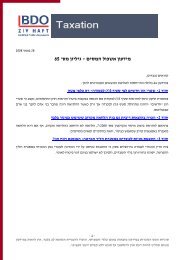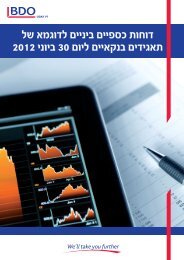preface
preface
preface
Create successful ePaper yourself
Turn your PDF publications into a flip-book with our unique Google optimized e-Paper software.
68<br />
ACCOUNTING AND AUDITING PERSPECTIVES<br />
6.6. PRINCIPAL DIFFERENCES BETWEEN ISRAELI GAAP AND<br />
U.S. GAAP<br />
A study of financial statements in Israel, presented in conformity with Israeli<br />
GAAP, outlines the differences between Israeli accounting policy and/or<br />
presentation of data and/or disclosures in notes to the financial statements as<br />
compared with other countries, such as the United States, United Kingdom, etc.<br />
Care should be taken that those differences apply only to non public Israeli<br />
companies, which are not required to apply IFRS.<br />
The principle differences between Israeli and U.S. GAAP are:<br />
♦ Consolidated financial statements - The requirement to consolidate<br />
financial statements in Israel is similar to that of other countries, except for<br />
one major difference. In Israel, unlike the United States, no consolidation is<br />
made when minority shareholders maintain over 75 percent of shares with<br />
rights to profit, even though the parent company holds controlling shares in<br />
excess of 50%. Furthermore, there is no consolidation of variable interest<br />
entities under Israeli GAAP - unlike under U.S. GAAP, FIN46(R):<br />
Consolidation of Variable Interest Entities - An Interpretation of ARB<br />
No. 51.<br />
♦ Proportionate consolidation of legal entities - This is not an accepted<br />
practice in the United States, although it is customary in Israel.<br />
Additionally, in case of an investment with the original intention of being<br />
realized in the short term - Israeli GAAP does not permit application of the<br />
equity method, while this is acceptable in the United States.<br />
♦ Statement of cash flows - Cash and cash equivalents are defined differently<br />
in Israel and the United States. Furthermore, financing leases are included in<br />
Israel in financing and investment activities, while under U.S. GAAP they<br />
are included in non-cash activities. Additional presentation requirements<br />
exist in the United States beyond what is required in Israel in respect of<br />
taxes on income and interest on loans. Differences also exist in treating<br />
“currency translation” of foreign subsidiaries.<br />
♦ Pension liabilities - In the United States, valuation of pension liabilities is<br />
based on the present value of actuarial estimates. In Israel, a provision for<br />
severance pay is generally made instead of, or in addition to any provision<br />
for pension, calculated on the assumption of retirement of all employees as<br />
of the date of the financial statements.<br />
BDO Israel

















